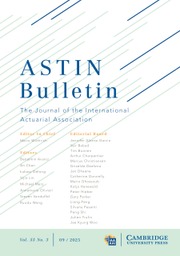No CrossRef data available.
Article contents
Fair Valuation of Life Insurance Contracts Under a Correlated Jump Diffusion Model
Published online by Cambridge University Press: 09 August 2013
Abstract
In this paper, we study the fair valuation of participating life insurance contract, which is one of the most common life insurance products, under the jump diffusion model with the consideration of default risk. The participating life insurance contracts considered here can be expressed as portfolios of options as shown by Grosen and Jørgensen (1997). We use the Laplace transforms methods to price these options.
- Type
- Research Article
- Information
- Copyright
- Copyright © International Actuarial Association 2011
References
Abate, J. and Whitt, W. (1992) The Fourier-series method for inverting transforms of probability distributions. Queueing Systems
10, 5–88.Google Scholar
Bacinello, A.R. (2001) Fair pricing of life insurance participating contracts with a minimum interest rate guarantees. Astin Bulletin
31, 275–297.CrossRefGoogle Scholar
Bacinello, A.R. (2003) Pricing guaranteed life insurance participating policies with annual premiums and surrender option. North American Actuarial Journal
7(3), 1–17.CrossRefGoogle Scholar
Ballotta, L. (2005) A Lévy Process-Based Framework for the Fair Valuation of Participating Life Insurance Contracts. Special Issue of Insurance: Mathematics and Economics
37(2), 173–196.Google Scholar
Ballotta, L., Haberman, S. and Wang, N. (2006) Guarantees in with-profit and unitized with profit life insurance contracts: fair valuation problem in presence of the default option. Journal of Risk and Insurance
73(1), 97–121.Google Scholar
Brennan, M.J. and Schwartz, E.S. (1976) The pricing of equity-linked life insurance policies with an asset value guarantee. Journal of Financial Economics
3, 195–213.Google Scholar
Briys, E. and de Varenne, F. (1994) Life insurance in a contingent claim framework: pricing and regulatory implications. The Geneva Papers on Risk and Insurance Theory
19(1), 53–72.CrossRefGoogle Scholar
Briys, E. and de Varenne, F. (1997) On the risk of life insurance liabilities: debunking some common pitfalls. Journal of Risk Insurance
64(4), 673–694.CrossRefGoogle Scholar
Briys, E. and de Varenne, F. (1997) Valuing risky fixed rate debt: an extension. Journal of Financial and Quantitative Analysis
32(2), 239–248.Google Scholar
Bernard, C., Le Courtois, O. and Quittard-Pinon, F. (2005) Market value of life insurance contracts under stochastic interest rates and default risk. Insurance: Mathematics and Economics
36(3), 499–516.Google Scholar
Cai, N. and Kou, S.G. (2007) Option pricing under a hyper-exponential jump diffusion model. Working paper.Google Scholar
Cai, N. (2009) On first passage times of a hyper-exponential jump diffusion process. Operations Research Letters
37, 127–134.CrossRefGoogle Scholar
Chen, A. and Suchanechi, M. (2007) Default risk, bankruptcy procedures and the market value of life insurance liabilities. Insurance: Mathematics and Economics
40, 231–255.Google Scholar
Chi, Y.C. (2010) Analysis of Expected Discounted Penalty Function for a General Jump-Diffusion Risk Model and Applications in Finance Insurance: Mathematics and Economics
46(2), 385–396.Google Scholar
Cossette, H. and Marceau, E. (2000) The discrete-time model with correlated classes of businesses. Insurance: Mathematics and Economics
26, 133–149.Google Scholar
Gerber, H.U. and Shiu, E.S.W. (2005) The time value of ruin in a Sparre Andersen model. North American Actuarial Journal
9(2), 49–84.Google Scholar
Grosen, A. and Jørgensen, P. (1997) Valuation of early exercisable interest rate guarantees. Journal of Risk Insurance
64(3), 481–503.Google Scholar
Grosen, A. and Jørgensen, P. (2002) Life insurance liabilities at market value: an analysis of insolvency risk, bonus policy, and regulatory intervention rules in a barrier option framework. Journal of Risk Insurance
69(1), 63–91.Google Scholar
Huang, J.Z. and Huang, M. (2003) How much of the corporate-treasury yield spread is due to credit risk? SSRN elibrary, http://ssrn.com/abstract=307360.
Google Scholar
Kou, S.G. (2002) A Jump Diffusion Model for Option Pricing. Management Science
48, 1086–1101.Google Scholar
Kou, S.G. and Wang, H. (2004) Option pricing under a double exponential jump diffusion model. Management Science
50, 1178–1192.CrossRefGoogle Scholar
Kou, S.G. and Wang, H. (2003) First passage times of a jump diffusion process. Advances in Applied Probability
35, 427–445.Google Scholar
Kou, S.G., Petrella, G. and Wang, H. (2005) Pricing path-dependent options with jump risk via Laplace transforms. Kyoto Economic Review
74(1), 1–23.Google Scholar
Le Courtois, O. and Quittard-Pinon, F. (2008) Fair Valuation of Participating Life Insurance Contracts with Jump Risk. The Geneva Risk and Insurance Review
33(2), 106–136.CrossRefGoogle Scholar
Pelsser, A. (2000) Pricing double barrier options using Laplace transforms. Finance and Stochastics
4, 95–104.Google Scholar
Petrella, G. (2004) An extension of the Euler Laplace transform inversion algorithm with applications in option pricing. Operations Research Letters
32, 380–389.Google Scholar
Riesner, M. (2006) Hedging Life Insurance Contracts in a Lévy Process Financial Market. Insurance: Mathematics and Economics
38(3), 599–608.Google Scholar
Wang, G.J. and Yuen, K.C. (2005) On a correlated aggregate claims model with thinning-dependence structure. Insurance: Mathematics and Economics
36, 456–468.Google Scholar
Zhang, Z.M., Yang, H. and Li, S.M. (2010). The perturbed compound Poisson risk model with two-sided jumps. Journal of Computational and Applied Mathematics
233, 1773–1784.Google Scholar


